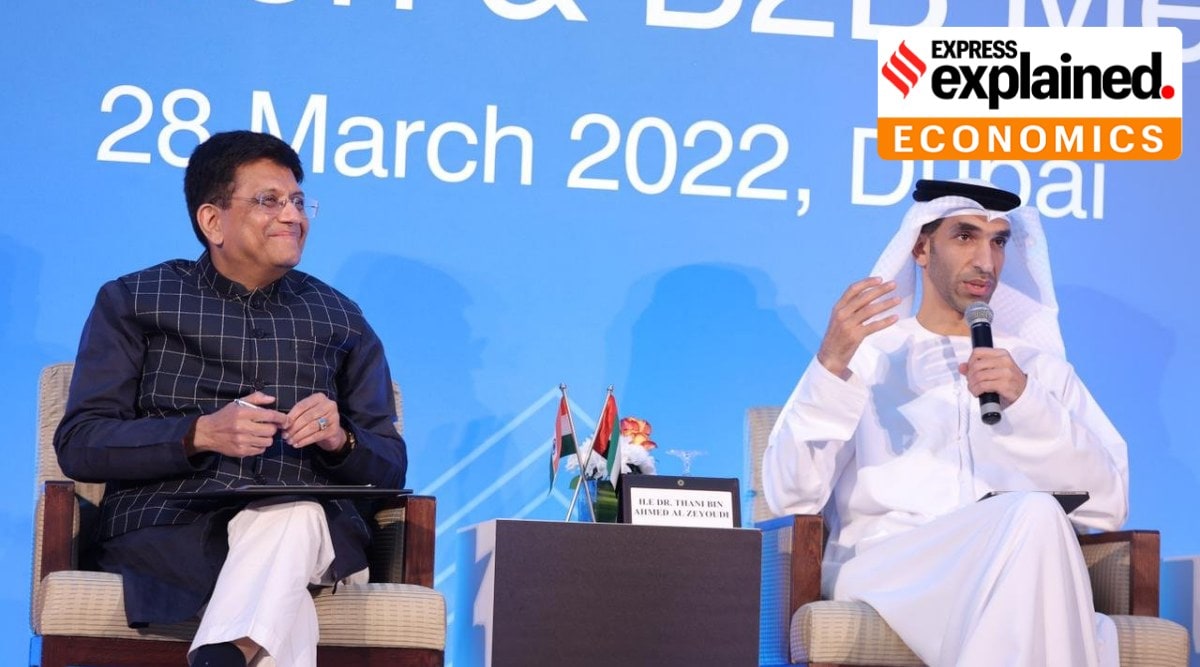Explained: Why inclusion of government procurement in India’s trade pact with the UAE is significant
In a first, India has included government procurement in the India-UAE Comprehensive Economic Partnership Agreement. Why is this significant? What are key industry concerns? What protections are included for the domestic industry?
 Minister of Commerce & Industry Piyush Goyal and UAE Minister of State for Foreign Trade Thani bin Ahmed Al Zeyoudi address a meet on India-UAE CEPA (Twitter/@PiyushGoyal)
Minister of Commerce & Industry Piyush Goyal and UAE Minister of State for Foreign Trade Thani bin Ahmed Al Zeyoudi address a meet on India-UAE CEPA (Twitter/@PiyushGoyal)The India-UAE Comprehensive Economic Partnership Agreement (CEPA), set to come into force on May 1, includes a chapter on government procurement, granting UAE-based companies treatment on par with domestic companies. This is the first instance of India including government procurement in a Free Trade Agreement (FTA).
Why is inclusion of government procurement in the India-UAE CEPA significant?
India has previously been unwilling to discuss government procurement in bilateral or multilateral trade agreements to protect domestic firms which rely on it. India is also not a signatory to the World Trade Organisations Government Procurement Agreement (GPA), but has been an observer since 2010.
Experts note that the move marks a major shift in India’s stance on government procurement, which had also been a stumbling block in major FTA negotiations, including those with the European Union. Government procurement is estimated to be worth about 20-22 per cent of GDP.
“One of the reasons why negotiations with the EU got stalled was this. This sudden U-turn, especially when the industry has not recovered, is really very surprising,” said Biswajit Dhar, professor at Jawaharlal Nehru University.
Dhar added that opening up government procurement to the UAE meant that India would also have to open procurement to Japan and would likely be asked to open up the area in future agreements. India is currently negotiating FTAs with Australia, UK, Canada and the EU.
India’s FTA with Japan requires that if India offers a third country any advantageous treatment in government procurement, then it would have to provide Japan an opportunity to enter negotiations for the extension of such treatment on a reciprocal basis.
What are key industry concerns?
Sources at an industry association noted that the fast-tracked negotiations for the India-UAE CEPA meant there weren’t significant discussions with industry stakeholders on the inclusion of government procurement in the FTA. The negotiations for the agreement were concluded in 88 days.
“We only came to know the provisions (regarding government procurement) when the agreement was released. Industry and stakeholders would have preferred to be involved and contribute meaningfully based on the needs of industry,” said an official at an industry association, who wished to remain anonymous. The source did, however, note that the industry welcomed certain protections for MSMEs in the agreement.
What protections are included for the domestic industry in the FTA?
Under the agreement, only government procurement contracts worth over about Rs 200 crore will be open to UAE-based companies on the same terms as Indian firms. The move is aimed at protecting the interests of MSMEs that supply goods and services to the government. The list of 34 ministries and departments for which government procurement would be open to UAE-based companies includes the ministries of power, health and education.
The deal does not, however, cover procurement by all subordinate entities of these ministries and departments, including autonomous bodies, government-owned companies and public sector enterprises.
The chapter on government procurement also grants India “the right to apply a preferential procurement policy for its MSMEs in accordance with its laws and regulations.”
Experts, however, note that India may have to remove carve outs in government procurement in future trade deals with larger trading partners such as the EU.
Newsletter | Click to get the day’s best explainers in your inbox
- 01
- 02
- 03
- 04
- 05







































